My son and daughter just couldn’t wait. When the gift arrived two weeks early, they insisted that I open it right away—even though my birthday wasn’t for another two weeks. It was a customized license plate for my classic Triumph TR convertible. I loved it and truly appreciated my kids’ thoughtfulness. But on the day of my actual birthday, I had no gift to open. It was no big deal, but my birthday would have been a little more special if I’d waited to open their gift.
Similarly, waiting to take your Social Security retirement income can provide major benefits. But many people file as soon as possible. Later, they may regret that decision when they realize their income could have been much higher if only they’d waited. Let’s discuss the three things to consider before you start taking Social Security.
First, When Will You Begin Taking Social Security Income?
For some, deciding when to claim Social Security can be daunting. Others make up their mind quickly, perhaps well in advance.
The percentage of people filing for Social Security at the minimum age has been declining over the years, but it’s still a popular choice, a close second to full retirement age. Twenty-three percent of men and nearly 25% of women file for Social Security retirement benefits at age 62, which is the earliest most Americans are eligible.1 While you’re entitled to begin collecting Social Security income at age 62, this is considered early filing. There are valid reasons for filing early, but there’s a trade-off: a reduction in benefits, which can sometimes be substantial.
Many early filers may not be aware of the consequences. A recent survey showed that 51% of adults age 26 and older believe that if they claim benefits early, their benefits automatically go up when they reach full retirement age.2 Unfortunately, that’s not the case. Unfortunately, that’s not the case.
You May Not Need Social Security Income Right Away
Today, many people work past the date they’re ‘supposed to’ retire. The top three reasons included a desire to stay active and involved, enjoyment of work, and having money to buy “extras.”3 Since workers are more educated and healthier than previous generations, they’re more than capable of doing so.4
If you continue to work, even part-time, or if you retire but have other sources of income that can sustain your current lifestyle, you may not need to take your Social Security benefits as soon as you’re eligible.
Second, How Deferring Social Security Income Can Benefit You
You might be thinking, “If I don’t start taking Social Security, I could be missing out.” Not necessarily. If you’re able to hold off on taking your Social Security income, it can literally pay off.
In the bar chart example below, age 67 is full retirement age (FRA).* (This is true for those born in 1960 or later. If you were born in 1959 or earlier, your FRA will be different. For more details, please see Retirement Benefits/Starting Your Retirement Benefits Early at ssa.gov). At FRA, your benefit will not be reduced. Note the difference between the monthly income amounts when filing at age 67 vs. age 62.
Although, if you defer collecting Social Security income beyond FRA, your benefit can actually grow. The longer it’s deferred—which can be done until age 70—the greater the benefit. In essence, the Social Security Administration will credit your benefit by 8% each year. The chart illustrates these incremental increases over time.
A bigger monthly benefit certainly is nice, but there may be a more pressing reason to defer filing for Social Security.
Early Vs. Delayed Filing: How It Affects Your Social Security Benefit
Portion that would be received assuming a benefit of $1,000 at a Full Retirement Age (FRA) of 67*

*When to Start Receiving Retirement Benefits, Publication No. 05-10147, ssa.gov, 1/23
Deferring Social Security Until Age 70 Can Guard Against Running Out of Money in Retirement
Thanks to advances in medicine and technology, and the adoption of healthier lifestyles, we’re living longer. For a couple who are 65 today, there’s a 50% chance that one person will be alive at 92.5 It’s encouraging to know that life expectancy is up. But remember, living longer will cost more. Maybe a lot more.
An average retired couple age 65 in 2023 can expect to spend $315,000 to cover healthcare expenses in retirement.6 This can dramatically raise your risk of running out of money. But delaying your Social Security benefit to ultimately receive more monthly income can help prevent healthcare expenses from eroding your retirement savings.
Third, How Delaying Social Security Income Can Benefit Your Spouse
Delaying Social Security not only boosts your benefit, it can increase your spouse’s benefit, too.
When you file for your Social Security benefits, your spouse may be eligible for a spousal benefit if you’re the higher earner and vice versa. It can’t be claimed until the higher-earning spouse files, which they must do before the lower-earning spouse.7 The maximum spousal benefit is 50% of the higher earner’s benefit and is capped at their FRA.
This probably sounds a bit confusing. Let’s see how it would work for a couple who’ve been married for 10 years, Evelyn and Alex, below.
Early vs. Delayed Filing: See the Difference
The Advantage of Waiting*
If Evelyn files for Social Security benefits when she becomes eligible at age 62, her monthly benefit amount will be reduced. But waiting until her full retirement age of 67 to file, or even until age 70, can make a significant difference.
| Benefit at 62 | Benefit at 67 | Benefit at 70 | ||
| Evelyn |  |
 |
 |
 |
Potential Bonus: A Higher Spousal Benefit7
Suppose Evelyn is married and also the higher earner. Whenever she files for Social Security retirement benefits, her husband Alex may opt to collect the spousal benefit. He’s eligible at age 62, but filing early will reduce his spousal benefit. In this example, if Alex waits until his FRA to collect the spousal benefit, he can increase his benefit by $500 per month, or $6,000 per year.
| Benefit at 67: | Alex is entitled to the greater of: | ||
| Evelyn |  |
$3,500 | Up to 50% of Evelyn’s FRA benefit
$1,750 |
| Alex |  |
$1,250 | His own benefit
$1,250 |
Note: The spousal benefit will not increase if Evelyn delays filing. This is a very basic example, but some situations can be complicated. We strongly urge you to consult the Social Security Administration with any questions you may have.
Again, spousal benefits will be reduced if the lower-earning spouse files before their own FRA.7
Anyone thinking about this option may want to look at earnings differences between spouses. If incomes have been mostly similar, or a lower monthly income is manageable, the lower-earning spouse may want to claim Social Security first, while the higher earner waits until age 70, allowing their benefit to grow.
“What if Social Security Goes Away? I Could Miss Out!”
Social Security isn’t without its funding challenges. After decades of collecting more than it paid out, it built a surplus of assets.8 Now, with a retiree population that’s outpacing the working population—and living longer—the system is beginning to pay out more than it takes in. The program will likely need to change at some point to continue, but it’s too important to go away.
Until that happens, it’s still worth thinking about deferring your Social Security income.
As You Consider When To Begin Taking Social Security, Remember These Three Things
First, filing for Social Security income prior to your full retirement age can dramatically reduce your monthly income amount. Second, if you have no immediate need for Social Security income, consider holding off on filing. This will allow your benefit to grow 8% each year you defer past your FRA, until the age of 70. Third, by waiting until their own FRA to file, your spouse can potentially collect the maximum spousal benefit.
I Won’t Be Opening My Gifts Early
After my birthday letdown, I now wait, despite my kids’ wishes, to open my gifts on my birthday. Filing for Social Security at the earliest possible time can be tempting, and many people can’t resist. The downside is that it reduces their Social Security income—and that won’t change. There are instances when filing for Social Security early, or at full retirement age, may be the best option. But if that’s not true in your situation, consider the benefits of waiting before making your final decision.
Next Steps
- Think about whether you’ll work in retirement or have other expected income sources
- Calculate how much monthly income you’ll need in retirement, and determine whether your expenses can be covered without Social Security
- Talk to your financial professional about your retirement income strategy
1 The Most Popular Ages to Collect Social Security, usnews.com, 8/23
2 The Nationwide Retirement Institute 2023 Social Security Consumer Survey, nationwidefinancial.com
3 2023 RCS Fact Sheet #2, Expectations About Retirement, 4/23
4 Joseph Coughlin, The Longevity Economy, 2017
5 How Much Do You Need for Retirement if You Live to Be 100?, newretirement.com, 6/20
6 Fidelity® Releases 2023 Retiree Health Care Cost Estimate: For the First Time in Nearly a Decade, Retirees See Relief as Estimate Stays Flat Year-Over-Year, fidelity.com, 6/23
7 Benefits for Spouses, ssa.gov, 2/21
8 10 Social Security Myths That Refuse to Die, aarp.org, 4/23
All information provided is for informational and educational purposes only and is not intended to provide investment, tax, accounting or legal advice. As with all matters of an investment, tax, or legal nature, you should consult with a qualified tax or legal professional regarding your specific legal or tax situation, as applicable.






